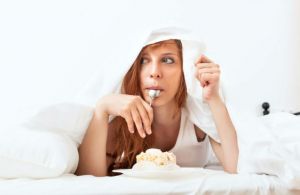
You’ve probably heard of sleepwalking, tossing and turning in your sleep and night terrors… all of which are labeled under parasomnia, a certain category of sleep disorders. However, one such sleep disorder that you may not have heard of – and in fact, that many people don’t believe is real – is sleep eating.
The most common form of parasomnia is basic sleepwalking. Up to 30 percent of children and 7 percent of adults may be afflicted with this condition. Sleep eating is a subset of sleepwalking. Dr. Oz estimates that approximately one million adults could be sleep-eaters, and many of them may not even be aware of it.
The type of sleep eating that can be classified as a parasomnia condition is nighttime sleep-related eating disorder (SRED). Individuals who suffer from this condition may unconsciously sleepwalk to the kitchen, and eat any type of foods that are within reach.
The truly dangerous part about this is that sometimes sleep-eaters will eat uncooked meats, and even non-food items, including toxic substances and inedible items that may be around.
Dr. Oz reports that some sleep-eaters may even try to chop or cook their food while asleep, which can obviously be extremely dangerous.
People who sleepwalk and/or sleep-eat do so early in the sleep cycle, during the first stages of NREM sleep. While much about these disorders is still unknown, there are possible connections to sleep apnea, certain medications, including, ironically, sleeping pills, hormonal imbalances or some other issue with the sleep centers of the brain, which control sleep cycles.
Another type of sleep-eating condition is known as night-eating syndrome (NES). People who fall into this category are conscious during their episodes, but experience strong urges to binge during the night, even after a full dinner.
They are often unable to sleep until they have gotten up to raid the fridge, and choose to indulge in carbohydrates in particular. It is debatable whether NES is a true sleep disorder, or whether it falls into the category of a compulsive eating disorder, according to Dr. Oz.
If you think you may suffer from either of these conditions, you may wish to see a sleep specialist to monitor your sleep cycles. If you’re not sure if you’re eating at night, look for clues such as food missing or moved around in your kitchen, or unexplainable weight gain. For sufferers of SRED, it is important to keep yourself safe while you look for a solution; keep kitchen chemicals and utensils out of easy reach at night, perhaps even locking the cabinets.
As certain medications may trigger SRED, talk to a health professional about any meds you are taking, and whether they may be the culprit. While there is no known ‘cure’ for sleepwalking or SRED, taking steps to naturally improve your quality of sleep may be highly beneficial. Daily meditation before bed may work wonders in quieting your mind and helping you ease into a deeper, more restful sleep.
Moderate to intense physical exercise in the afternoon can also help you to enjoy deeper sleep. Certain herbs can also help: drinking a cup of chamomile tea does the trick for some, and pure, organic kava-kava root extract may work wonders, as it may greatly enhance how ‘deep’ you sleep.
 Essential oils such as lavender and ylang ylang, applied to pressure points right before bed – especially before mediation – may aid in restful sleep. Some research has found that drinking tart cherry juice in the evening helps to curb insomnia, as tart cherries contain melatonin, the hormone that signals to your body that it is time to sleep.
Essential oils such as lavender and ylang ylang, applied to pressure points right before bed – especially before mediation – may aid in restful sleep. Some research has found that drinking tart cherry juice in the evening helps to curb insomnia, as tart cherries contain melatonin, the hormone that signals to your body that it is time to sleep.
For serious sleep disorders, talking to a natural health professional, especially one that is experienced in sleep-related conditions, could do a world of good.
-The Alternative Daily
Sources:
http://www.doctoroz.com/videos/eating-your-sleep
http://www.everydayhealth.com/specialists/general_internist/liebowitz/qa/how-can-i-stop-sleepwalking/index.aspx
http://cherrish.net/news/dr-oz-says-drink-tart-cherry-juice-for-sleep

